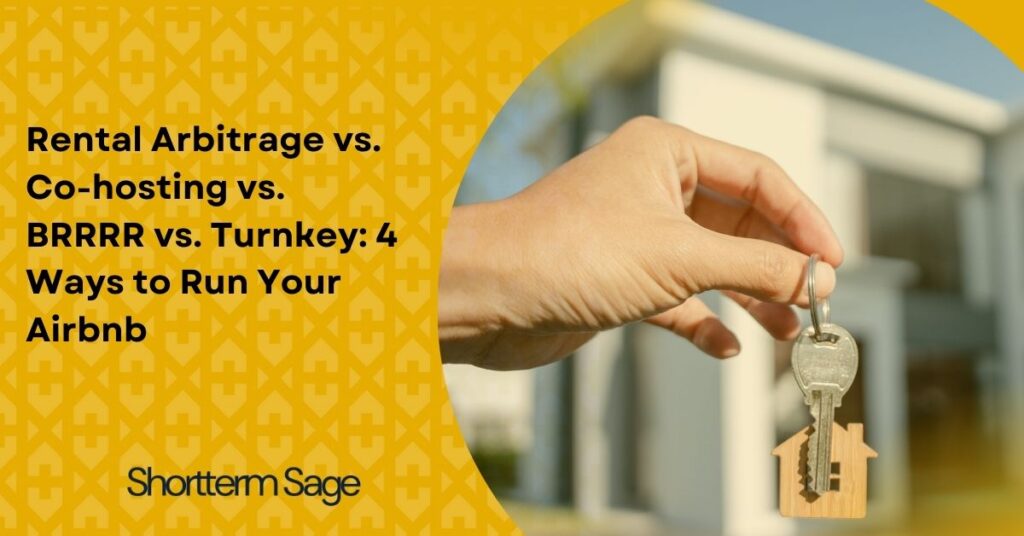
Sites like Airbnb and Vrbo make it possible for anyone to stay at home and make a six-figure income by subleasing other people’s properties. How exactly is that done? In this post, we’ll discuss 4 popular methods of running an Airbnb: rental arbitrage, co-hosting, BRRRR, and turnkey.
The Airbnb rental arbitrage model is the business of renting a property on a long-term basis, then subletting it on a nightly, weekly, or monthly basis at a higher rate — for profit. It’s often done in prime, growth locations. Transactions are done on booking platforms like Airbnb, VRBO, Booking.com, and other online travel agencies (OTAs).
In the rental arbitrage method, you won’t need to own a house, condo, or apartment of your own. With the amount of money you would’ve spent purchasing those, you could just lease a handful of properties and scale your business quickly. Not only will you make money faster, but you also have more potential to save for future investments.
The rental arbitrage model is a method that doesn’t require credit nor much capital. Your initial outlay would only be minor expenses like rent, security deposit, legal and business fees (application fee, licenses, permits, and insurance), utility deposit, and professional photography (if desired) for your listing.
If the place you’re looking to rent isn’t furnished, then you’ll have to factor in interior design, furniture, appliances, décor, cookware, and linen. Let’s say, a total of around $5,000 to $10,000.
Your profit would result from your day-to-day labor as a property manager and marketing agent, which shouldn’t take more than a couple of hours each day. Airbnb rental arbitrage has increasingly become a popular way to earn passive income.

To calculate how much you can make from rental arbitrage on a certain property, you’ll have to find out the average monthly rent in your market versus the average Airbnb rate per night in the area. You can do this by using tools like AirDNA, a site that provides vacation rental market analysis.
If you feel you can book the property regularly — while factoring in your monthly costs (rent + operating expenses) — then you can expect to get a decent profit.
For example, a landlord rents a property for $1000 a month. You sign the lease for it, furnish it, and re-rent it on Airbnb for $125 per night. If you’re able to lease it for 8 days, you’d have your monthly rent covered.
But if you’re able to rent it for 20 days, you’d make $2,500 for that period. You can pay the landlord $1000 rent, spend let’s say $100 for utilities, and another $70 for insurance. You’re then left with $1,330 in profit for that month.
See how quickly arbitrage brings in cash without posing too many risks? With traditional real estate investment, you’d have to worry about down payments, mortgage, property taxes, maintenance costs, and other concerns.
Arbitrage is also more flexible. If the property turns out to be unprofitable, you have the option to end the lease early then find a more profitable unit in the area.
In most cities, rental arbitrage is legal. Check with your county and state to verify STR and zoning laws. And check regularly, because regulations can change from time to time. Arbitrage is legal only where and for as long as you’re allowed to.
Also, be aware that some cities — both in the US and different parts of the world — have either banned or imposed restrictions on Airbnb. Some places will allow you to lease only the property you live in or restrict the number of properties you can sublease. Others limit short-term leasing to only a certain amount of days per year.
Aside from your local government’s approval, it’s crucial to also get your landlord’s and HOA’s permission. Make sure you obtain your landlord’s formal thumbs-up in writing, with the help of a lawyer who can facilitate a rental arbitrage agreement for both of you to sign.
After gauging the profitability of the market you’re eyeing, study other variables such as demand, appeal, and seasonality of the area. Then, search for potential properties. If a home or apartment’s revenue potential is significantly higher than the cost of rent, chances are you’re going to make a profit.
The next step is to visit the property and pitch an arbitrage deal with the owner or landlord. Know the most common landlord objections so you know how to address them, iron out the kinks, and hopefully seal a deal.
Airbnb co-hosting is a bit like an Airbnb property or vacation rental management business. Both are about helping hosts manage their STRs and take care of their guests. But, unlike property managers, co-hosts are usually not formally trained and experienced real estate professionals. They don’t usually handle the branding, finance, and other major aspects of an STR business.
Airbnb defines a co-host as usually someone the listing owner already knows and trusts — like a family member, a friend, or a neighbor. He or she takes the burden off the hosts’ shoulders by seeing to the day-to-day operations of hosting and making sure guests have a satisfying stay.
Normally, Airbnb co-hosts take care of the following tasks:
If you’re a host who is busy with a full-time job, are not living in the area where your rental is, or are simply overwhelmed by the daily grind of managing a property, you might want to get a co-host.

The two of you can decide how responsibilities and profits are going to be shared. (Most co-hosts charge anywhere from 10% to 30% of the profits.) You’d also want to decide if or how much your co-host will contribute to operational expenses.
Airbnb welcomes co-hosting on its platform and even allows up to 3 co-hosts per listing. Read their terms of service to learn more about the policies and guidelines for running a successful co-hosting partnership.
Additionally, co-hosts are allowed to partner with homeowners who have multiple properties. If you’re an Airbnb property owner in an area with legal restrictions, limited in the number of properties you can rent, you may want to just co-host additional units you’d want to manage. That way, you can still scale your STR business without going the traditional route of shouldering all the licensing, security deposits, furnishing costs, and other major concerns.
Read also: Co-hosting on Airbnb — Can You Do it Without Prior Co-hosting Experience?
BRRRR is an acronym for Buy-Repair-Rent-Refinance-Repeat. It’s where you purchase an undervalued or distressed property that you can fix-up. You’ll be adding value to it by rehabilitating it then renting it out to tenants. That way, you can generate cash flow to pay off the mortgage, make a profit, and generate shares over time.
Once a sizable amount of equity is built up in the property, you can then buy a second property using profit left over from financing the first property as a down payment.
You can do the whole thing again and again over a period of 5 to 10 years. Eventually, you’ll have built up a portfolio of assets that will provide you with enough passive income to leave your full-time job. It’s a good way to achieve financial independence over time.
The downside of BRRRR real estate investing is that the startup cost is high. It also takes several months to start, and you’d need to know how to pay the mortgage while the property isn’t generating income yet. You can also expect to wait a year before you can move on to the next property.
Unlike BRRRR, a turnkey property is a fully rehabbed home or apartment that an investor can purchase and re-rent out immediately. Turnkey properties are often bought from a company that specializes in renovating fixer-uppers.
Since they’re ready to be occupied upon purchase, turnkeys can generate income right away with little or no effort from the new owner. All he or his tenant has to do is just show up, literally turn the key, and move in.
However, turnkey properties are on the expensive side, since purchasing a newly revived property is a huge investment.
The above 4 methods are just some of the different business models you can use to pursue a successful STR business. Each one has pros and cons, and you’ll have to study them carefully. Know the risks, have an exit strategy, and find out which one is right for you.
Our reviews are made by a team of experts before being written and come from real-world experience. Read our editorial process here.
Some of the links in this article may be affiliate links, which can provide compensation to us at no cost to you if you decide to purchase a paid plan. These are products we’ve personally used and stand behind. This site is not intended to provide financial advice. You can read our affiliate disclosure in our privacy policy.
About the author:
This website is operated and maintained by Short Term Sage LLC. Use of the website is governed by its Terms Of Service and Privacy Policy.
Short Term Sage LLC may link to content or refer to content and/or services created by or provided by third parties that are not affiliated with Short Term Sage LLC. Short Term Sage LLC is not responsible for such content and does not endorse or approve it.
We use cookies to help improve, promote and protect our services. By continuing to use this site, you agree to our privacy policy and terms of use.